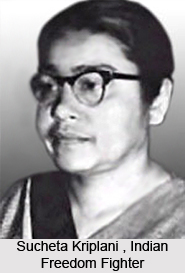 Sucheta Kriplani was born in 1908 in Ambala, Haryana.She belonged to a Bengali family. Before marriage her title was Mazumdar. She was the daughter of S.N. Majumdar, who was a government doctor and a nationalist. Sucheta Kriplani received education from Indraprastha College and St.Stephen`s College, Delhi. After that she joined Banaras Hindu University as a lecturer. In 1936 Sucheta Kriplani came into contact with great socialist leader in Acharya Kriplani and married him. She also joined in the Indian National Congress and actively participated in the Indian Freedom Movement.
Sucheta Kriplani was born in 1908 in Ambala, Haryana.She belonged to a Bengali family. Before marriage her title was Mazumdar. She was the daughter of S.N. Majumdar, who was a government doctor and a nationalist. Sucheta Kriplani received education from Indraprastha College and St.Stephen`s College, Delhi. After that she joined Banaras Hindu University as a lecturer. In 1936 Sucheta Kriplani came into contact with great socialist leader in Acharya Kriplani and married him. She also joined in the Indian National Congress and actively participated in the Indian Freedom Movement.
In 1946, on Gandhiji`s advice she was appointed Organizing Secretary of the Kasturba Gandhi National Memorial Trust. This led to her traveling all over India all along with Thakkar Bapa, who had been appointed Secretary of the Trust. It was also in the same year that Gandhiji sent Dada Kriplani to Noakhali, following the communal holocaust that had wrought havoc there. In 1942 He took part in the Quit India Movement along with Aruna Asaf Ali and Usha Mehta. During communal violence Sucheta Kriplani went to Noakhali with Gandhiji and worked hard. Sucheta insisted on going along with him and even when Dada came back from there she stayed on and became a real mother to the victims of atrocities.
It was in 1952 that Dada Kripalani had resigned as Congress President due to his differences with Jawaharlal Nehru, and set up the Krishak Mazdoor Praja Party before the first general election in 1952. In this election, Suchetaji won a seat to the Look Sabha from New Delhi as a K.M.P.P. candidate. Before that she had been a member of the Constituent Assembly. She had also been a delegate of India to the U.N.
Suchetaji was a very good organizer and she helped Dada in organizing the various parties with which, he became involved after leaving that Congress. When she joined the Congress after the split in the Congress in 1969, Dada Kriplani, did not do the same. Suchetaji helped in organizing the party in Delhi and elsewhere. When the student movement started in 1974, she took an active interest in it. Since, they both were in different parties, they were very professional and Suchetaji did not go out to canvass votes for her husband, but she was with which to see to his comfort and needs and to take care of his health.
She was a very good parliamentarian and was very articulate in the Lok Sabha debates. Circumstances, however, pulled her away into the provincial politics of UP, where Congress was divided into two groups, one led by Kamalapati Tripathi and the other by C.B. Gupta. Their power struggle led to C.B. Gupta urging Suchetaji to leave Delhi and assume the chief Minister ship of U.P, since he had lost the election. As the Chief Minister she did a very good job. She showed herself to be a very efficient administrator and an able politician. She was intelligent, hard-working, well read and had a lot of studious habits. Moreover, she was an honest and sincere person. Thus, she is still remembered by old-timers as the best Chief Minister U .P. ever had, since her lifestyle was also very simple, very unlikely to a C.M`s position.
After they both retired from active politics, the Kripalanis built for themselves a nice house in Sarcomata Enclave in New Delhi. Suchetaji in later years discharged her duties as a very able and careful housewife. She would always make sherbets and jams and a variety of other eatables at home in order to economize and entertain in style. In these days, she wrote three or four autobiographical articles for The Illustrated Weekly of India, which covered her early life. It was unfortunate that she did not complete her autobiography. Whatever earnings, these both had earned and saved, were put into the Lok Kalyan Samiti, set up for the service of the poor and needy in Delhi. The health services rendered by the Lok Kalyan Samiti, as also its other welfare activities, had been of the finest quality.
Though she was a very active person, always immersed in political and social activities, she was always careless about her own health. Suchetaji had met with a serious accident in the Simla Hills, where she sustained a spinal injury, but in time fully recovered from it. However, in 1972, she first showed signs of cardiac insufficiency. Two heart attacks came, from which she made complete recovery.
In 1974, Dada had bronchitis and a persistent cough, making him irritable. But Suchetaji continued the duty of looking after his health day and night, with great devotion. When he was a little better, she engaged a night nurse for him but would nevertheless come to see him twice every night. If Dada rang for the servant she would come herself. However, she never told him that she had cardiac pain. But on 29 November 1974, Sucheta Did had a last heart attack. It was so severe that she had to be shifted to the All-India Institute of Medical Sciences. And on 1 December 1974, Suchetaji passed away, following a massive coronary attack, leaving an older spouse prostrate with grief and with no one to look after him.






